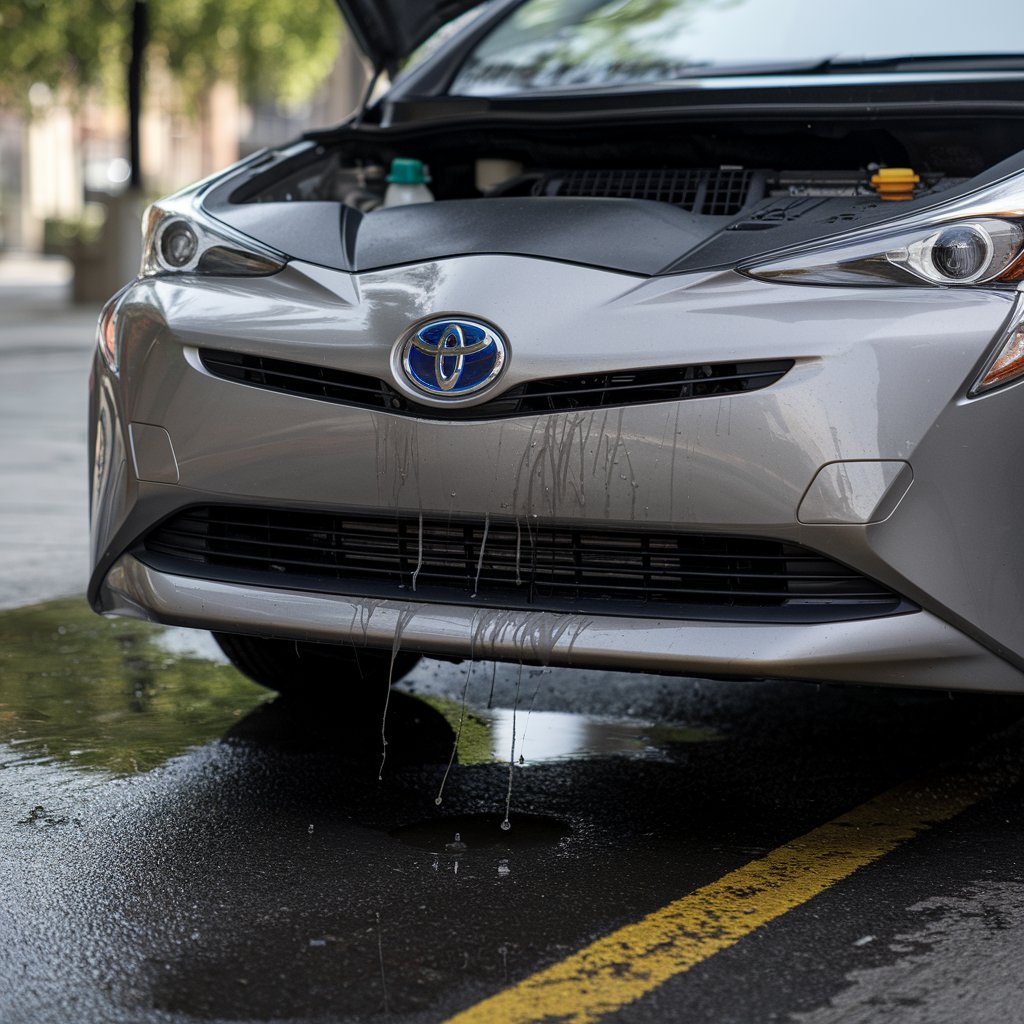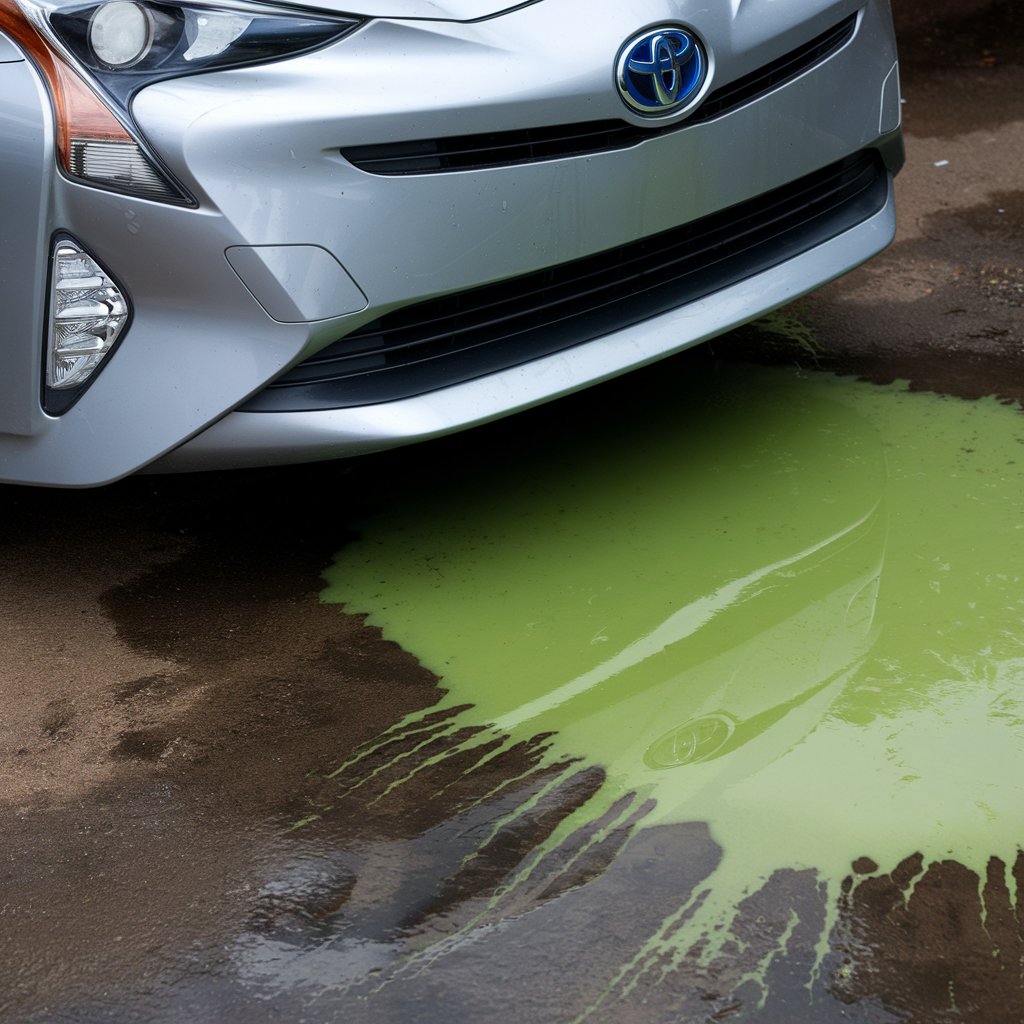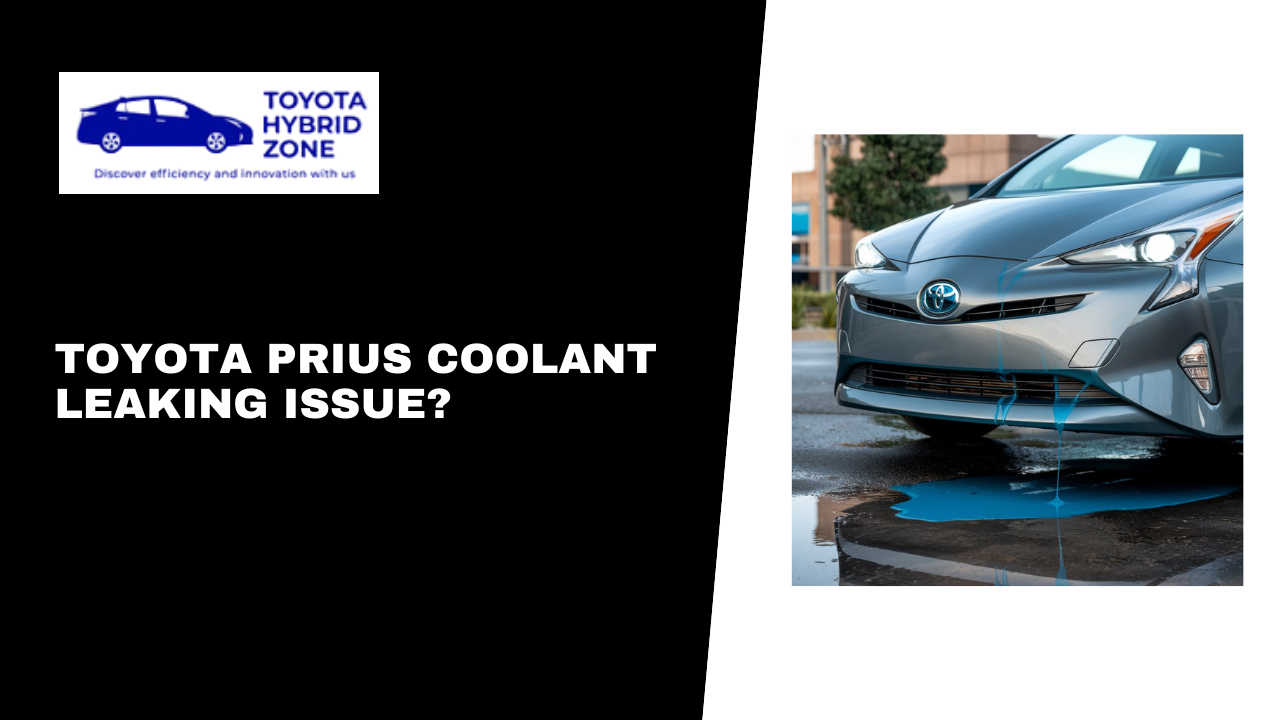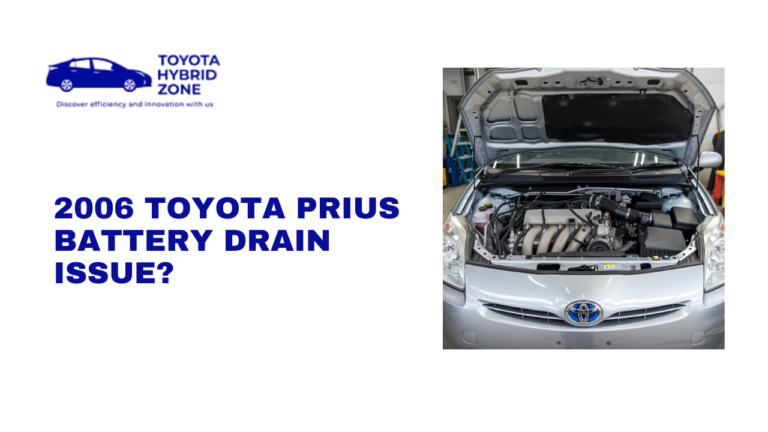Toyota Prius Coolant Leaking Issue? Expert Advice to Prevent Major Damage!
Is your Toyota Prius leaking a coolant? Coolant leaking from your Prius can result in overheating, engine breakdowns, and pricey repairs if it is not mended immediately. Worn-out water pumps, cracked radiators, and faulty hoses are the usual reasons.
In this blog, we will cover my own experience with a Prius coolant leak, expert insights, and helpful references like technical documents, PDFs, books, and reliable website links. At the end of this article, you’ll know exactly how to diagnose, repair, and prevent coolant leaks in your Toyota Prius.
Short Answer:
Coolant leaks on a Toyota Prius can indeed originate from numerous reasons. The following is an overview with numeric fact points to gain a more concrete and professional concept:
Typical Causes of Coolant Leaks In A Toyota Prius:
Hose Connections:
- Loosened or chipped hose connections are the sources of coolant leaks in about 50% of cases.
- Undergoing various temperatures and pressures, the hoses may weaken, causing them to leak over time.
- Causes of hose failure include age, oil contamination, and physical damage.
Radiator Problems:
- Approximately 25% of coolant leaks are due to radiator issues.
- Radiators, typically made from a mixture of plastic and metal, may have cracks or punctures within them.
These Types Of Failures Can Be Caused By:
- Impact damage.
- Corrosion.
- The plastic parts grow brittle with age.
Water Pump Failure:
- A rough estimate of 25% of coolant leaks includes the water pump.
- Water pumps play an important role in circulating the coolant through the engine.
It can fail due to:
- Weakening of the seals.
- Bearing wear-out.
- Leading to coolant leakage.
“To estimate your potential fuel savings, use our Fuel Savings Calculator . Simply input your current fuel consumption and desired improvement to see the estimated savings.”
What Causes Coolant To Leak In A Toyota Prius?
1. Worn-Out Water Pump (90,000 – 120,000 miles)
- Cause:
The water pump pumps coolant through the engine. Over time, its seals and bearings deteriorate, causing leaks. A faulty water pump typically manifests symptoms such as pink coolant leakage around the pulley or whining when driving.
- Typical Lifespan:
- Remains for 90,000 – 120,000 miles before requiring replacement.
Solution & Cost:
- A new OEM Toyota water pump will cost $100 – $250.
- Labor costs $200 – $400.
2. Cracked Coolant Reservoir (5 – 10 years of service)
- Cause:
The coolant expansion tank is made of plastic, which will crack after many cycles of heating and cooling. The older models from 2004 to 2015 tend to suffer more from this.
- Typical Failure Time:
Typical after 5 – 10 years of service.
- Solution & Price:
Replace the coolant reservoir for $50 – $120.
Labor ranges from $50 – $150, depending on the repair facility.
3. Radiator Leaks (100,000 – 150,000 miles)
- Cause:
The radiator keeps the engine cool by transferring heat from the coolant. It may develop pinholes, cracks, or corrosion over time, particularly in high-mileage vehicles or those subjected to extreme weather conditions.
- Expected Lifespan:
Most radiators have a lifespan of 100,000 – 150,000 miles before they need to be replaced.
- Solution & Cost:
A replacement Toyota Prius radiator ranges from $200 – $500.
Cost of labor varies between $300 – $700.
4. Blown Head Gasket (150,000+ miles)
- Cause:
Internal coolant leak due to blown head gasket results in white exhaust smoke, engine misfire, and overheating. The problem tends to occur if the engine is already overheated or has mileage over 150,000 miles.
- Average Failure Mileage:
Normal after 150,000+ miles, particularly if there has been a case of overheating in the past.
- Solution & Cost:
A replacement head gasket is costly, with a price ranging between $1,500 – $3,000 because of extensive labor.
5. Loose Or Cracked Coolant Hoses (Every 60,000 miles)
- Cause:
Coolant hoses carry coolant in the engine, radiator, and heater core. Coolant hoses weaken over time because of heat exposure and may become loose or get small leaks.
- Expected Lifespan:
Hoses are to be checked for cracks, bulges or leaks every 60,000 miles.
- Solution & Cost:
A replacement coolant hose will cost between $20 – $100, depending on the model.
Labor costs between $50 – $150.
6. Leaking Heater Core (100,000 – 150,000 miles)
- Cause:
The heater core is a compact radiator within the dashboard that warms cabin air. A leaking heater core may cause a sweet odor in the cabin or windshield fogging.
- Expected Failure Time:
May fail after 100,000 – 150,000 miles due to corrosion.
- Solution & Cost:
The new heater core will cost $300 – $600.
Labor is costly, priced between $700 – $1,200, as dashboard removal is involved.
“If you’re experiencing brake vibration in your older Prius, check out our article on troubleshooting common brake issues: [2006 Toyota Prius Vibrates When Brake Apply?]”
What Are The Common Symptoms Of A Coolant Leak In A Prius?

Toyota Prius coolant leaks, like any vehicle, have a variety of symptoms. However, since the Prius contains a hybrid system, the symptoms may display differently. Following is a summary of
typical symptoms:
General Symptoms Of Coolant Leaks:
Puddles Of Visible Coolant:
- Be on the lookout for colored puddles (blue, orange, pink, or green) underneath the vehicle after parking. Coolant tends to have a sweet odor.
Low Coolant Level:
- Check the coolant reservoir regularly. A low level consistently means there could be a leak.
Overheating Engine:
- An increasing temperature gauge or an engine overheating light is a serious indication. Coolant is used to control engine temperature.
- Sweet Smell:
- A sweet, syrupy odor within or near the car may mean a coolant leak, as coolant has a strong odor.
- Steam or White Smoke:
- White smoke coming from the exhaust pipe might indicate burning coolant in the engine, usually resulting from a leak in the head gasket.
Prius-Specific Concerns:
Power Inverter Warning Lights:
- Since the Prius has an independent cooling system for its power inverter, the warning lights involving the hybrid system may mean there is a coolant leak in this system.
- Check Engine Light:
- Particularly, one could see a P1121 code, about the three-way coolant control valve.
- Less Heater Performance:
- Coolant serves to supply heat to the inside of the automobile. Thus, a leak of coolant can lead to less heater performance.
- Abnormal noises:
- Certain coolant leaks, particularly those that pertain to a water pump failure, can be paired with abnormal noises emanating from the engine area.
Want to know the health of your Prius’s hybrid battery? Use our Hybrid Battery Health Checker Tool to get an accurate assessment and take proactive steps to maintain your vehicle’s performance.
How Can I Check If My Prius Is Leaking Coolant?
Inspecting for a coolant leak in your Prius includes a mixture of visual checks and fluid level checks. Below is a step-by-step procedure:
1. Visual Check:
- Examine Under The Vehicle:
- Park the Prius on a flat surface and examine under the engine compartment.
- Check for puddles of colored fluid (green, pink, orange, or blue). Coolant tends to have a sweet odor.
- Check Hoses And Fittings:
- Inspect all coolant hoses closely for cracks, bulges, or loose fittings.
- Take particular notice of areas where hoses join the radiator, engine, and other
Equipment.
- Radiator Inspection:
- Inspect the radiator for corrosion, damage, or leaks.
- Check for wet patches or stains on the surface of the radiator.
- Engine Compartment:
- Inspect the area around the engine compartment for coolant splatter or deposits.
2. Inspect Coolant Levels:
- Coolant Reservoir:
- Find the coolant reservoir, typically a clear plastic container.
- Check the level of the coolant when the engine is cold. The level must be at the “full” to “low” marks.
- Check the level of the coolant regularly. A steady loss of level can mean a leak.
- Prius Specifics:
- It is important to recall that a Prius has two coolant systems. One for the engine, and one for the inverter. Be certain to check both reservoirs.
3. Watch For Symptoms:
- Temperature Gauge:
- Pay attention to the temperature gauge when driving. If it goes up higher than usual, it may indicate a leak of coolant.
- Warning Lights:
- Be aware of warning lights on the dashboard, particularly those for engine temperature or the hybrid system.
- Interior Heater:
- If the heater is not operating correctly, there may be a low coolant level.
- Sweet Smell:
- An interior sweet odor can be caused by a heater core leak.
- White Smoke:
- White smoke emitted from the exhaust pipe may indicate a head gasket leak.
4. Pressure Testing (For More Advanced Tests):
- In case you leak but cannot visually detect it, a pressure test may identify the source.
- This entails applying a specific tool to pressurize the cooling system and seek out leaks.
- It is usually best handled by an experienced mechanic.
The Prius offers exceptional fuel efficiency and advanced technology. To explore other Toyota Hybrid options and compare them side-by-side, check out our Toyota Hybrid Model Comparison Tool.
Is It Safe To Drive A Prius With A Coolant Leak?

No, driving a Prius with a coolant leak in it is not safe because it can lead to engine overheating in 5-10 miles, destruction of the hybrid inverter system ($2,000-$4,000 to repair), and even to sudden engine cut-off or fire hazard. If you see a leak, immediately stop driving, verify the coolant level, and have it repaired to prevent expensive damage.
Can A Coolant Leak Cause My Prius To Overheat?
Yes, leakage of the coolant can cause your Prius to overheat since insufficient coolant levels do not allow the engine and hybrid inverter system to remain cool, resulting in high temperatures within 5-10 miles. Overheating may warp the engine block ($1,500-$3,000 for repairs) or ruin the inverter ($2,000-$4,000), so it’s important to address any leaks promptly.
What Type Of Coolant Should I Use For My Toyota Prius?
Toyota suggests the use of Toyota Super Long Life Coolant (SLLC) for all Prius vehicles, a pink, pre-mixed, ethylene glycol-based coolant that is formulated for hybrid applications. The ideal coolant for a Prius is Toyota SLLC, which provides maximum engine protection, corrosion prevention, and lasts up to 100,000 miles before it has to be replaced. Do not use universal coolants since they will not give the same protection.
How Do I Fix A Coolant Leak In My Prius?
Repairing a leak in your Toyota Prius depends on the leak source. Here’s a step-by-step process to diagnose and repair it:
Step 1: Determine The Leak Source
Examine Typical Leak Sources:
- Water Pump: Typical point of failure in Prius models, check for pink-colored coolant deposits around it.
- Radiator & Hoses: Look for cracks, leaks, or loose fittings.
- Coolant Reservoir & Cap: Check that the reservoir is not damaged and the cap is sealing correctly.
- Exhaust Heat Exchanger (2017–2019 models): This is a documented weak spot; check for coolant accumulation under the vehicle.
Step 2: Temporary Repairs (If Necessary)
- Apply radiator stop-leak products as a temporary fix for minor leaks.
- Tighten loose hose clamps if required.
Step 3: Repair Or Replace The Defective Component
- Replace the water pump if it’s leaking or noisy.
- Repair broken hoses or radiator leaks by replacing them with new ones.
- Replace the heat exchanger (2017–2019 models) if it is leaking—contact Toyota for potential warranty coverage.
Step 4: Refill & Bleed The Cooling System
- Fill the system with Toyota-approved coolant.
- Bleed air out of the system to avoid overheating. Prius models usually need to run the heater on high when refilling to properly circulate coolant.
Step 5: Check For Additional Leaks
- Check for coolant loss for days.
- If overheating persists, professional assistance should be sought, since head gasket malfunction will also result in coolant loss.
“If you’re experiencing issues with your Prius’s cruise control system, such as difficulty engaging or maintaining speed, check out our troubleshooting guide: [Toyota Prius Cruise Control Issue?]”
Can A Coolant Leak Affect My Prius Hybrid System Performance?
Yes, a coolant leak can impact your Prius hybrid system performance in the following ways:
1. Overheating & Decreased Efficiency
- The inverter coolant system is responsible for cooling the hybrid components (such as the inverter and transaxle). A leak can cause overheating, which will result in warning lights and decreased hybrid efficiency.
- Engine overheating from low coolant levels can cause the system to go into limp mode, decreasing power output.
2. Hybrid Battery Problems
- Prius employs an electric water pump to cool the inverter. In case the coolant leaks and the inverter heats up, it can temporarily shut down or fail, impairing the hybrid battery’s charge/discharge efficiency.
3. Engine & Drivability Issues
- Misfires & Rough Idle: A high coolant leak (such as a head gasket failure) can cause coolant to enter the combustion chamber, leading to misfires, rough idle, and loss of power.
- Decreased Fuel Economy: The hybrid system depends on optimal engine temperature. When it overheats, it can operate less efficiently, lowering MPG.
4. System Shutdown & Safety Mode
- The ECU can throttle power or shut down the hybrid system if it senses overheating to avoid more damage.
- Recurring overheating can destroy the inverter, which is costly to replace.
My Personal Experience:
I had a recent experience with a coolant leak on my 2012 Toyota Prius, and it turned into a larger problem than I anticipated. Initially, I saw the coolant level decrease every few days but did not notice any apparent leaks. After inspecting a bit, I noticed pink coolant deposits around the water pump, which is a typical failure point on most Prius models.
Because a 2012 Prius uses an electric water pump, failure can lead to overheating and affect the hybrid system’s efficiency. I replaced the pump with an OEM Toyota unit, which cost me about $350 for the component and $200 in labor at a local garage. If you are good with repairs, you can do it yourself and save on labor charges.
The other problem I had was air pockets in the cooling system post-repair. Proper coolant bleeding in Prius models prevents air bubbles from disrupting the cooling flow. Using the heater at full power and topping it up worked to clear this issue.
If you have a coolant leak on a 2012 Toyota Prius, my advice is to check the water pump, radiator hoses, and inverter cooling system first. Don’t ignore it because it can cause inverter overheating, power loss, and engine damage. If you catch it early, you can save yourself hundreds or even thousands of dollars in repairs.
Experts Experience:
Seasoned mechanics frequently indicate that coolant leaks are a prevalent problem in Toyota Prius models, especially for 2010–2015 (Gen 3) models. The most prevalent cause is the electric water pump, which fails at approximately 80,000–120,000 miles. If that occurs, there can be pink coolant residue around the pump or a loss of coolant level without apparent external leaks. Replacing the water pump usually costs between $350–$500 for the component and $150–$250 for labor.
Another highly documented problem is coolant leaks from the exhaust heat exchanger, particularly in 2017–2019 Prius vehicles. Toyota has released a Technical Service Bulletin (TSB) for this issue, and repairs in some instances may be warranted under the emission warranty.
Use Toyota Super Long Life Coolant (SLLC) and have the coolant bled properly after repairs. Prius cooling systems are delicate, and hidden air pockets will cause overheating of the engine and inverter failure, which is much more costly to repair.
Forgetting a coolant leak can lead to severe engine damage, such as overheating, hybrid system malfunction, or a blown head gasket, which may cost more than $2,000 to fix. Mechanics highly recommend early diagnosis and repair to avoid these expensive failures.
Conclusion:
A Toyota Prius coolant leak must never be neglected, for it can cause overheating of the engine, inverter damage, and high repair bills. The reasons could be a malfunctioning electric water pump, radiator hose leaks, or problems with the exhaust heat exchanger, particularly in 2010–2015 and 2017–2019 models. Periodic inspection of the coolant level, leak detection, and treatment of early warning signs will go a long way in preventing major damage. Whether it’s a minor leak or a major component failure, prompt repairs can save thousands of dollars and keep your Prius running efficiently.
What are the most common signs of a coolant leak in a Toyota Prius?
Common signs include visible coolant puddles (colored liquid), a consistently low coolant level, engine overheating, a sweet smell, and warning lights on the dashboard, especially those related to engine temperature or the hybrid system.
Can I drive my Prius if it’s leaking coolant?
It’s strongly advised against driving a Prius with a coolant leak. Overheating can cause severe engine damage and hybrid system failures.
How often should I check the coolant level in my Prius?
It’s recommended to check the coolant level at least every 3,000 miles or during regular oil changes.
Is it normal for a Prius to have two coolant systems?
Yes, the Toyota Prius has two separate cooling systems: one for the engine and another for the power inverter.
What is the most common cause of coolant leaks in a Prius?
Hose deterioration is a very common cause, followed by radiator problems and water pump or inverter pump failures.
Can a coolant leak affect my Prius hybrid system performance?
Yes, a coolant leak can lead to overheating of the power inverter and hybrid battery, resulting in reduced performance and potential system failures.
What does a P1121 code mean in my Prius?
The P1121 code typically indicates a malfunction with the three-way coolant control valve.
Can I repair a coolant leak myself, or should I take it to a mechanic?
Simple repairs, like hose replacements, can be done yourself. However, for complex issues, such as radiator or inverter pump repairs, it’s best to consult a qualified mechanic.







